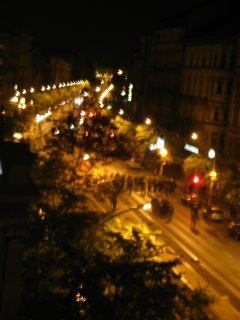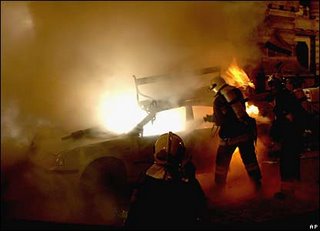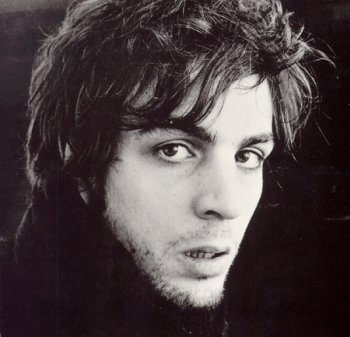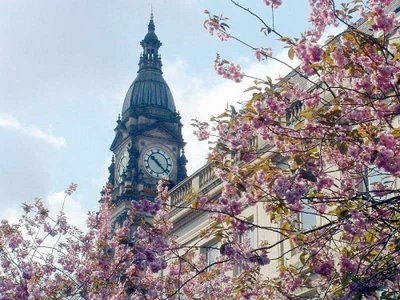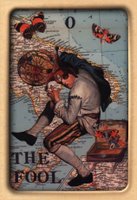Here's a confession. I learned one new thing only this year - to make music on my computer. I still remember last January gazing at the time-lines and various buttons of the comparatively simple (as it turns out) software GarageBand and sighing about the learning curve that it was going to involve. With help from a couple of my friends, and a bit of encouragement about the initial results, I finally got to record an album of digital sound quality where pay-by-the-hour time was not a factor. (Never before.) There's nothing brilliant on there, but I'm not in my 20s anymore. It's a good enough album, and it's a start. Making it gave me hours of pleasure, and only a little frustration - it's much easier than old-style 8-track cassette recording. So now I have a technique, and I want to go looking for some inspiration, perhaps in some of the "nu folk" compilatons that have been released in the last year or so.
 Suddenly, the kind of music I've always liked - and actually been making, since 1990 - more or less psychedelic acoustic stuff with a nod to folk tradition, has become, if not exacty mainstream, a genre that's written about in the music press. I think Devendra Banhart really got this thing going - it started happening in the States following his Golden Apples of The Sun compilation. Congratulations to people like King Creosote, Tunng, Espers and Joanna Newsom, as well as Rob da Bank and the Green Man festival (wish I could have been there) for carrying the torch! Maybe there will be enough fans of this kind of thing to come out and fund Roy Harper's pension?
Suddenly, the kind of music I've always liked - and actually been making, since 1990 - more or less psychedelic acoustic stuff with a nod to folk tradition, has become, if not exacty mainstream, a genre that's written about in the music press. I think Devendra Banhart really got this thing going - it started happening in the States following his Golden Apples of The Sun compilation. Congratulations to people like King Creosote, Tunng, Espers and Joanna Newsom, as well as Rob da Bank and the Green Man festival (wish I could have been there) for carrying the torch! Maybe there will be enough fans of this kind of thing to come out and fund Roy Harper's pension?With this, and Doctor Who being so popular in the UK now, I feel part of the cultural mainstream in a way I haven't for years. It's an eerie feeling. The last time was when I eagerly anticipated the third Oasis album and shook Tony Blair's hand in Downing Street (Spring '97) - neither of which I'm proud of now.
In 2006, apart from my album, I have achieved little else that's new. My life is on hold. The things I have most dearly longed for since I was a teenager, I have not got. I realise it's selfish to dwell on it. I don't.
I've managed to be unrelentingly upbeat ("unrelenting self-confidence and positivity" is a mantra I got from a friend in 2002) but sometimes it seems like putting a brave face on things. Against the backdrop of real, if not severe, disappointment, I've been getting on with it this year. Three things that have made me happy are positive feedback at work from our TEFL trainees (month after month, it's a shot in the arm); my unstintingly supportive boss; and Brindle, who keeps smiling through anything, and is determined that there's a spiritual meaning behind all of this!
I'm also happy to come home to "my" new flat in Budapest, where I can read, play, get online, and download at will. But it all seems a bit "adultescent", the Dylan period! I've often poured scorn on,
"...them that must obey authority
That they do not respect in any degree
Who despise their jobs, their destinies
Speak jealously of them that are free
Cultivate their flowers to be
Nothing more than something
They invest in."
feeling that I was something different - free, and for the most part happy. But I do wonder when I can comfortably begin to invest in the future in any way at all - I don't mean money and property, though that's part of it. In 2007, I would like to discover something of this, something long-term. If I don't succeed, I may turn the corner towards unhappiness and the beginnings of bitterness. There. I said it.
Best of 2006:
The best album was Broken Boy Soldiers by the Raconteurs. It's full of enthusiasm, and presses all the right retro buttons. I said that about the White Stripes before. Funny, that! "Good Ol'" MOJO picked it as album of the year too. I enjoyed every track but one, quite unusual in an album. I also enjoyed the incredibly hard-to-track down El Perro Del Mar debut (the tracks I've heard) for her lightness of touch and melodicism, and the unashamedly Hammond-driven grooves of Winner by Big Boss Man.
Some of the refreshed Beatles songs on Love were amazing - great to hear I Am The Walrus and Strawberry Fields in rounded digital brilliance. Love really worked - 9 out of 10. (My only reservation was the new ending of Strawberry Fields, which was a bit too much.) The best thing I heard all year was easily No Fit State by Hot Chip (actually from 2005) included on the Uncut compilation this month. It reminds me of the 1980s, not always a good thing, but is just such a effortlessly well crafted and well produced song, I never tire of it.
Films I liked were Knallhart (gritty realism), The Wind That Shakes The Barley (ditto), Children of Men (for the chillingly convincing vision of Britain in the future.) Best of all was Brokeback Mountain, for the reasons you've read elsewhere! And also because we've been ripping off the Texan drawl ever since in our office to mouth obscenities and let everyone know "Ah'm sick of beans" (sic?) The best TV I saw was Blackpool, a couple of years old now, probably? To me, it was just the kind of entertaining drama where you couldn't wait for the next episode. Nice to have that Dennis Potter-esque musical "commentary track" revived. The second Doctor Who series had its moments (notably, The Girl In The Fireplace) but wasn't a patch on the first.
The best books I read were (#2) Steven Pinker's How The Mind Works, where he deals neatly with Nature v Nurture and whether we should follow the ethical "dictats" of our genes - in the first two chapters! Then he goes on to discuss the mystery of consciousness... It's ambitious. Haven't finished it yet; the diagrams slow me down a lot. #1 was The Master and Margarita by Bulgakov, which I read and speculated about for hours, while I was living in Minsk (June) and gazing over the forest of tower blocks in the morning sun.
Being in Minsk was the peak of the whole year for me because it underlined that you can have an unforgettable experience form something you think beforehand will be disappointing. The summer was breaking out day after day, and the reaction of the trainees to the experience of communicative teaching added some belief against the doubt about whether the job I do is worth anything at all. (When you've turned your back on the property option and have opted to earn less to gain more in other ways, you need this!) My big wish in 2007 is for something else like this, and to feel that my life has some real momentum behind it. I'm also ready to record some more, in a stranger folkier vein. So bring it on.




